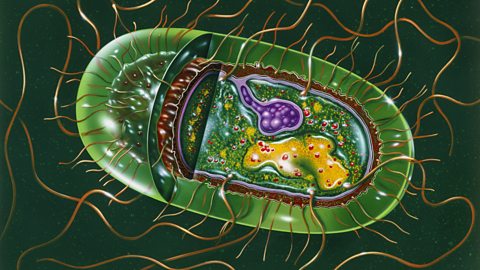Bacterial diseases
Not all bacteria are pathogenMicroorganism that causes disease. which cause disease. Many bacteriaSingle-celled microorganisms, some of which are pathogenic in humans, animals and plants. Singular is bacterium., like those found in the intestines, are useful. All bacteria are prokaryoteA single-celled organism which does not have a membrane-bound nucleus., and do not have a nucleusThe nucleus controls what happens inside the cell. Chromosomes are structures found in the nucleus of most cells. The plural of nucleus is nuclei.. Unlike viruses, they are cells and so are larger but cannot be seen without a microscope.
Gonorrhoea
Gonorrhoea is a sexually transmitted disease (STD) caused by a bacterium. It is a common infection, especially amongst people aged 15-24.
Gonorrhoea causes a burning pain when urinating and often forms a thick yellow or green dischargeGreen or yellow liquid containing pus that arises from an infection. from an infected person's penis or vagina. If untreated it can result in infertileNot being able to have children.. To prevent infection, people can abstain from having anal, oral or vaginal sex or use a barrier-type of contraceptionAny form of birth control used to prevent pregnancy. like a condom. Gonorrhoea is treated by antibioticsSubstances that control the spread of bacteria in the body by killing them or stopping them reproducing.. Many of the antibiotics which were effective against bacterial diseases like gonorrhoea are not as effective as they used to be. This is because bacteria are evolving to become resistant to existing antibiotics. Scientists are constantly trying to find new antibiotics to treat these diseases.
Salmonella

Salmonella is a genusA rank in classification below family and above species. of bacteria that causes food poisoning. This often means abdominal cramps, vomiting and diarrhoeaLiquid faeces. . It is often found in unhygienic kitchens, undercooked foods such as meat, eggs and poultry, or the same foods that have not been reheated properly. To prevent the spread of salmonella in the UK, all poultry are vaccineSubstances containing disabled antigens of a particular disease, usually administered via injection. Vaccines stimulate the body to produce antibodies to provide immunity against that disease. against it. Cooking food thoroughly, after preparing it in hygienic conditions, is the best way to avoid illness.
Greg James describes the effects of bacterial growth and how to prevent foodborne illness